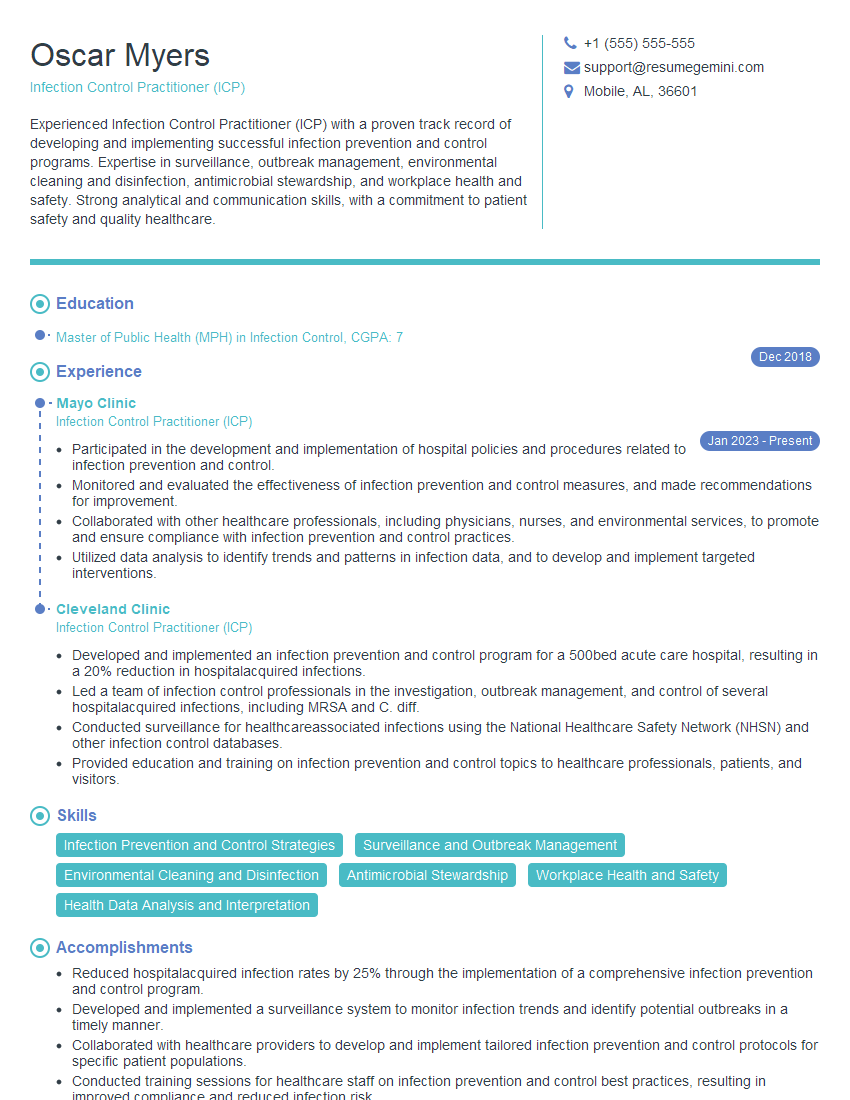Are you a seasoned Infection Control Practitioner (ICP) seeking a new career path? Discover our professionally built Infection Control Practitioner (ICP) Resume Template. This time-saving tool provides a solid foundation for your job search. Simply click “Edit Resume” to customize it with your unique experiences and achievements. Customize fonts and colors to match your personal style and increase your chances of landing your dream job. Explore more Resume Templates for additional options.

Oscar Myers
Infection Control Practitioner (ICP)
Summary
Experienced Infection Control Practitioner (ICP) with a proven track record of developing and implementing successful infection prevention and control programs. Expertise in surveillance, outbreak management, environmental cleaning and disinfection, antimicrobial stewardship, and workplace health and safety. Strong analytical and communication skills, with a commitment to patient safety and quality healthcare.
Education
Master of Public Health (MPH) in Infection Control
December 2018
Skills
- Infection Prevention and Control Strategies
- Surveillance and Outbreak Management
- Environmental Cleaning and Disinfection
- Antimicrobial Stewardship
- Workplace Health and Safety
- Health Data Analysis and Interpretation
Work Experience
Infection Control Practitioner (ICP)
- Participated in the development and implementation of hospital policies and procedures related to infection prevention and control.
- Monitored and evaluated the effectiveness of infection prevention and control measures, and made recommendations for improvement.
- Collaborated with other healthcare professionals, including physicians, nurses, and environmental services, to promote and ensure compliance with infection prevention and control practices.
- Utilized data analysis to identify trends and patterns in infection data, and to develop and implement targeted interventions.
Infection Control Practitioner (ICP)
- Developed and implemented an infection prevention and control program for a 500bed acute care hospital, resulting in a 20% reduction in hospitalacquired infections.
- Led a team of infection control professionals in the investigation, outbreak management, and control of several hospitalacquired infections, including MRSA and C. diff.
- Conducted surveillance for healthcareassociated infections using the National Healthcare Safety Network (NHSN) and other infection control databases.
- Provided education and training on infection prevention and control topics to healthcare professionals, patients, and visitors.
Accomplishments
- Reduced hospitalacquired infection rates by 25% through the implementation of a comprehensive infection prevention and control program.
- Developed and implemented a surveillance system to monitor infection trends and identify potential outbreaks in a timely manner.
- Collaborated with healthcare providers to develop and implement tailored infection prevention and control protocols for specific patient populations.
- Conducted training sessions for healthcare staff on infection prevention and control best practices, resulting in improved compliance and reduced infection risk.
- Established a network of infection control professionals within the healthcare system to share best practices and collaborate on infection prevention strategies.
Awards
- Received the Association for Professionals in Infection Control and Epidemiology (APIC) Excellence in Infection Control Award for outstanding contributions to the field.
- Recognized by the Centers for Disease Control and Prevention (CDC) for exceptional leadership in infection prevention during the COVID19 pandemic.
- Received the Excellence in Healthcare Epidemiology Award from the Society for Healthcare Epidemiology of America (SHEA) for innovative research on infection control practices.
- Recognized by the American Hospital Association (AHA) for exceptional work in promoting patient safety and infection prevention.
Certificates
- Certified Infection Control Professional (CIC)
- Fellow of the Infection Control Society of America (FAPIC)
- Certified Healthcare Facility Manager (CHFM)
- Certified Infection Preventionist (CIP)
Career Expert Tips:
- Select the ideal resume template to showcase your professional experience effectively.
- Master the art of resume writing to highlight your unique qualifications and achievements.
- Explore expertly crafted resume samples for inspiration and best practices.
- Build your best resume for free this new year with ResumeGemini. Enjoy exclusive discounts on ATS optimized resume templates.
How To Write Resume For Infection Control Practitioner (ICP)
- Highlight your experience in developing and implementing infection prevention and control programs.
- Quantify your results whenever possible, such as reducing hospital-acquired infections by a certain percentage.
- Demonstrate your knowledge of infection prevention and control guidelines and standards.
- Showcase your ability to work independently and as part of a team.
Essential Experience Highlights for a Strong Infection Control Practitioner (ICP) Resume
- Develop and implement infection prevention and control programs for healthcare facilities.
- Lead a team of infection control professionals in the investigation, outbreak management, and control of hospital-acquired infections.
- Conduct surveillance for healthcare-associated infections using national databases and other infection control resources.
- Provide education and training on infection prevention and control topics to healthcare professionals, patients, and visitors.
- Monitor and evaluate the effectiveness of infection prevention and control measures, and make recommendations for improvement.
- Collaborate with other healthcare professionals, including physicians, nurses, and environmental services, to promote and ensure compliance with infection prevention and control practices.
Frequently Asked Questions (FAQ’s) For Infection Control Practitioner (ICP)
What is the role of an Infection Control Practitioner (ICP)?
An ICP is responsible for preventing and controlling infections in healthcare settings. This includes developing and implementing infection prevention and control programs, conducting surveillance for infections, investigating outbreaks, and providing education to healthcare professionals and patients.
What are the qualifications for an ICP?
Most ICPs have a bachelor’s or master’s degree in public health, nursing, or a related field. They also typically have experience in infection prevention and control.
What are the key skills and qualities of an ICP?
Key skills and qualities of an ICP include: strong analytical and problem-solving skills, excellent communication skills, the ability to work independently and as part of a team, and a commitment to patient safety.
What is the job outlook for ICPs?
The job outlook for ICPs is expected to be good in the coming years. This is due to the increasing focus on patient safety and the need to prevent and control infections in healthcare settings.
What are the career advancement opportunities for ICPs?
ICPs can advance their careers by becoming managers of infection prevention and control programs, directors of public health, or epidemiologists.